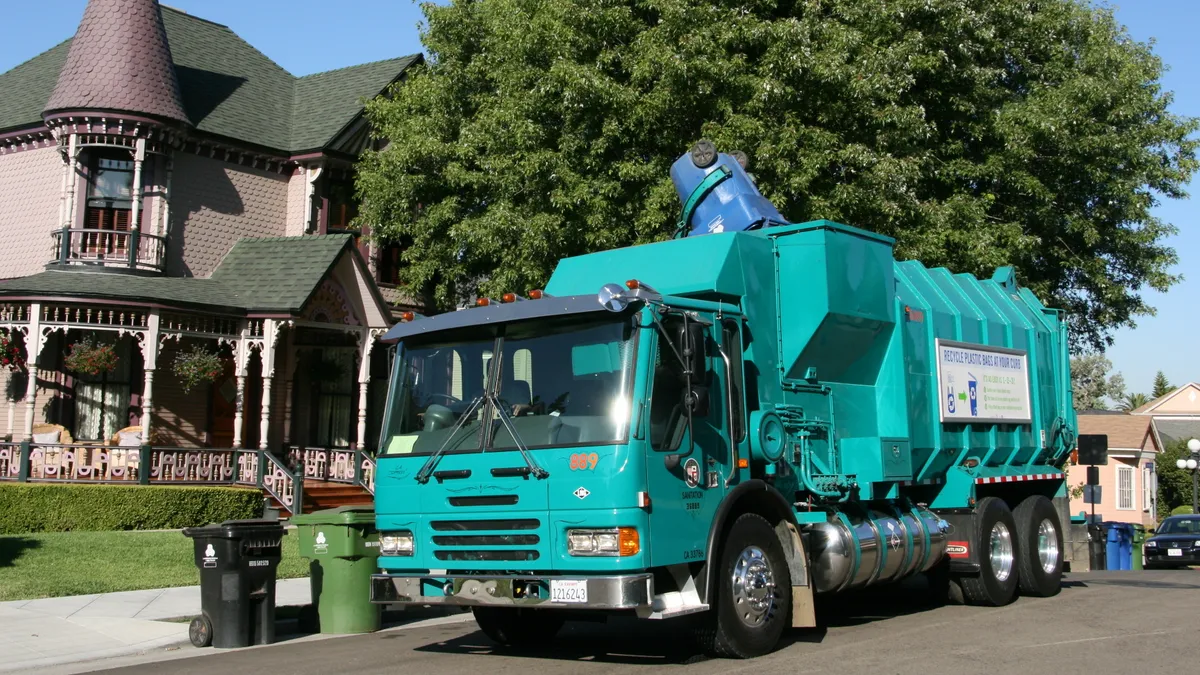Dive Brief:
- The Los Angeles Board of Public Works approved an $11 million request from LA Sanitation & Environment on Wednesday to compensate Arakelian Enterprises, known as Athens Services, for past and future processing of recyclables at its Sun Valley MRF through June.
- The company is currently processing recyclables from the city’s East and West Valley areas without a long-term contract. LASAN issued an RFP for these services late last year and a bid decision is pending.
- The board also approved a request to increase gate rates at the city-owned Central Los Angeles Recycling and Transfer Station. The new rate will be $83 per ton, up from $79, effective after a 30-day notice period.
Dive Insight:
LASAN is responsible for the curbside collection of waste, recycling and organics from an estimated 750,000 single-family houses and apartment buildings with four units or less. This contract represents more than one-third of that recyclable material, serviced via the Blue Bin program.
This is the latest short-term arrangement between the city and Athens, which city staff and board members described as not the ideal scenario. LASAN’s most recent RFP for this work went out in 2020.
"Negotiations were underway to finalize a long term contract and a temporary contract was established through yearly letters of agreement. However, there were roadblocks in the negotiation process so LASAN issued a new RFP to be able to explore other options,” said Nicholas Nuccio, an environmental engineering associate with the agency, during the meeting.
Last year, the BPW approved a $9 million one-year arrangement with Athens to continue providing services through the end of FY23. But since that expired, Athens had effectively been processing recyclables from these areas without any agreement.
This meant the BPW was asked to approve payment for more than six months of service that had already occurred. Staff described the request as regrettable and said the agency had hoped to finalize a contract during the prior fiscal year. They attributed the delay in requesting this week’s approval to a broader review by other city entities. Cecile Bunsio, a division manager within LASAN’s Solid Resources group, described this as a “stopgap measure.”
BPW President Aura Garcia said this was “not the normal procedure, not what we want,” because “we are being put in a situation where we have to sign it” since Athens already performed the work. “So it's not the position that this board wants to be in,” she said.
The board also raised questions about safety standards at the MRF. The interim agreement does not allow for new safety requirements, but a long-term contract could. City staff said other benefits of a longer-term contract include requirements about waste characterization studies, which would allow LASAN to perform more targeted education and outreach to reduce contamination rates.
Joseph Brajevich, executive vice president of government strategies at Athens, said during the meeting that “employee safety is of utmost concern to us” and “we have an exceptional record at that facility.” He noted the company had been “delivering the service for the last six months in good faith” and was committed to working with the city.
According to LASAN staff, this new agreement through June was based on the expectation of Athens processing an estimated 107,000 tons of recyclables from the select areas during FY24. Athens is charging a base rate of $101 per ton. With discounts based on the value of recovered commodities, LASAN anticipates paying $84.30 per ton. Bunsio said “our goal is to have a contract in place by June 30.”
LASAN did not respond to a request for comment about how many responsive bids it received for the processing contract RFP, but Athens was expected to be a bidder.
During an October BPW meeting, when LASAN was requesting approval to issue the RFP, staff said it would be a five-year deal with the potential for two five-year extensions. If the contract were to run the full 15-year term, with no discounts for commodity revenue, the estimated cost could be $86 million.
In the meantime, Athens secured a price increase for this current interim agreement — up from a base fee of $91 per ton. LASAN said the company cited an increase in the city’s required living wage, along with higher disposal costs and fuel prices.
LASAN also cited higher disposal costs in its own request to increase fees at the city-owned transfer station. The rate increase specifically applies to commercial customers, which account for an estimated 310 tons per day of the facility’s overall 3,010-ton-per-day throughput. This includes haulers from the recycLA franchise program, as LASAN designed that system so smaller haulers in certain zones could access CLARTS whereas larger competitors already had their own transfer infrastructure.
Negotiations remain ongoing between LASAN and Athens, and multiple other haulers, for a possible recycLA contract update. Staff are expected to report back to the Los Angeles City Council later this month.















